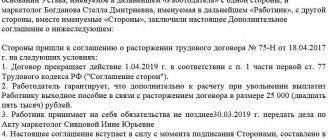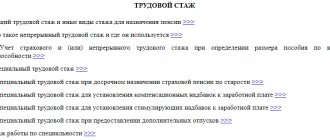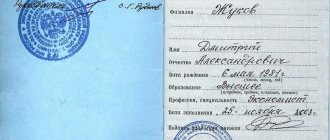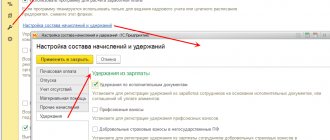Dismissal is the end of the employment relationship between the subjects of contractual relations: the employer and the employee of the enterprise (organization), individual entrepreneur. The grounds and guarantees arising in the process of dismissal from work are determined by labor standards, in particular, the Labor Code of the Russian Federation.
The reasons for dismissal from work are recognized as complying with the law if they meet the following criteria:
- the person is dismissed for legal reasons, with actual circumstances;
- compliance with the employee dismissal mechanism;
- termination of labor relations for a period of time.
If these conditions are met, the reasons for the citizen’s dismissal comply with the rules of law.
When the employment relationship ends
Possible reasons for dismissal from work are established by law. In particular, they are the following reasons:
- An agreement (agreement) between the subjects of legal relations.
- Expiration of the agreement.
- Termination of the agreement on the initiative of the employer.
- Transfer of an employee with his consent to another employer.
- Refusal of an employee to work due to a change in ownership of property, in connection with reorganization procedures in the company.
- An employee’s refusal to work due to changes that are not specified in the contract.
- Refusal of an employee to be transferred to another type of work due to his state of health, confirmed by the conclusion of specialists.
- Refusal of an employee to be transferred to another region.
- Circumstances that occurred due to force majeure.
- Violation of the provisions of the Labor Code if they exclude the possibility of continuing work activity.
On what grounds can dismissal be carried out while on vacation?
The Labor Code of the Russian Federation establishes a direct ban on dismissal during vacation for all reasons related to the employer’s initiative. An exception is the complete liquidation of the company (Part 6 of Article 81 of the Labor Code of the Russian Federation). All other reasons for termination of cooperation do not serve as an obstacle to terminating the employment contract during such a period.
Thus, you can part with an employee while he is on vacation for the following reasons:
- Agreement between the parties to the employment contract.
- The worker's own initiative.
- Liquidation of a company or death of an individual employer.
- Refusal of an employee to continue working under new conditions.
- Circumstances beyond the control of the parties, including those related to violation of the law when concluding an employment contract.
The ban on dismissal during leave by decision of the employer applies regardless of its type - be it regular, additional, without pay, for child care, etc.
When an employer has the right to separate employees
Note that the reasons for dismissal from work at the initiative of the employer are varied, for example:
- liquidation measures at the enterprise or closure of the work of individual entrepreneurs;
- staff reduction.
But what guarantees are provided to the population in these cases? Let's give examples.
- Part 1 of Article 180 of the Labor Code of the Russian Federation guarantees that an employer, in the event of liquidation, reduction of staff or numbers, is obliged to offer an employee a vacant position.
- When staffing is reduced, the employee must be paid severance pay in the amount of average earnings, wages and the monetary value of unused vacation. At the same time, wages are due according to the average for the entire period of employment. This is the time when a person is looking for a job and is registered with the labor exchange, but, in general, no more than two months.
Features of calculations when leaving on vacation
In case of separation from an employee while on vacation, the following situations are possible:
- the employee immediately wrote an application for leave with subsequent dismissal - then his last working day will be the date preceding the start of the rest period. All vacation pay upon dismissal for him will go through without subsequent adjustments;
- the employee is fired after the start of the vacation and the last working date falls on some day before its end. In this case, the vacation is formally interrupted immediately after the day of termination of the employment contract. Moreover, if an employee has unused vacation days accrued for the period after its interruption, vacation pay is counted toward compensation for the unused vacation period.
- the day of dismissal falls strictly on the last day of vacation - in this case, recalculation is also not necessary.
If the right to vacation upon dismissal of an employee was used in advance, the amount of vacation pay must be withheld when making salary payments to him. In this case, the restrictions on retention provided for in Art. 138 Labor Code of the Russian Federation.
The legislation does not oblige the employer to make an order to change the vacation period and recalculate vacation pay, but it does not prohibit this either. If desired, the company can issue such an order in any form indicating the days of vacation actually used and the remaining period that is subject to compensation.
Employer initiative
Here are the most common reasons for dismissing an employee at the initiative of the employer:
- the employee’s inadequacy for the position held;
- failure to fulfill the employee’s job duties without valid reasons;
- severe violation of labor duties by an employee (failure to appear at work for more than 3 hours, theft, coming in drunk, non-compliance with labor protection provisions, intentional actions by an employee, an immoral act committed by a teacher, etc.);
- providing the employer with false documents when applying for a job;
- other cases.
For failure to fulfill labor duties and discipline - clause 5 of Art. 81 Labor Code of the Russian Federation
Each employee is obliged to fulfill job duties and not violate discipline.
Responsibilities are written in the employment contract and job description. For example, a salesperson advises clients, accepts money, and sends requests to suppliers.
Discipline is working hours, dress code, rules of communication with colleagues. Discipline is stated in the employment contract and internal regulations (if applicable).
For violation of duties and discipline, a reprimand or reprimand is given. The seller did not return the check - a reprimand, was late for a shift - a reprimand. This is called disciplinary action under Art. 192 Labor Code of the Russian Federation.
When two or more reprimands and comments have accumulated, the employee can be fired. The reason is called “for repeated failure by an employee to fulfill his job duties without good reason.” Suitable for dismissal for poor work, rudeness with clients, lateness.
To be dismissed, you must file a disciplinary sanction at least twice within a year. This is done according to Art. 193 Labor Code of the Russian Federation:
- Record the employee’s misconduct - with a memo about being late, an act of failure to fulfill an obligation.
- Get the employee to explain why this happened. The request is submitted against signature. Then they wait two days, if the person is silent, they issue an act of refusal.
- Issue an order for a reprimand or reprimand.
The order is made no later than one month from the discovery of the offense and six months from its commission. Vacation and sick leave time is not counted. The employee is notified of the order within three days. If he rebels, he makes an act of refusal. If you violate the deadlines, the collection will not work.
Example: a manager collected an employee’s mistakes and fired him
A full-time developer did not deliver the work on time and disrupted the delivery of the entire department’s project. He received a reprimand. Then he left work 40 minutes early - a reprimand.
The company collected two orders and fired for failure to fulfill duties. It was not possible to challenge it - case No. 33-19370.
Article about employee responsibility
Employee initiative
The most peaceful way to end an employment relationship is the employee’s initiative to leave work. The reasons for voluntary dismissal may be related to the citizen’s professional activities or personal reasons. The employer specifies Article 77, 1, clause 3 as the basis for dismissal - at his own request. But the reasons for leaving a job voluntarily may also be related to other circumstances in the employee’s life.
Usually, the employer has the right not to let the employee go without working for 2 weeks. Are there any reasons for dismissal without working through the Labor Code of the Russian Federation? Yes, an employee can be fired without working if there are good reasons for this. In other situations, he is required to work at the enterprise for 2 weeks so that the employer can find a replacement for him. Thus, the reasons for voluntary dismissal without work in all cases can only be valid.
How to formalize dismissal while on vacation
Any dismissal of an employee during vacation for permitted reasons is formalized in the usual manner. The grounds for termination of cooperation are as follows:
- when leaving on one's own initiative - a statement from the employee indicating the specific last day of work;
- upon termination of cooperation by mutual agreement - a dismissal agreement signed by the participants in the labor relationship, with the date of separation recorded in it;
- upon dismissal due to liquidation - a decision to terminate activities made by the owner or the court;
- an event that does not depend on the wishes of the parties to the employment contract - a document must confirm its actual occurrence (for example, a summons to the army, a medical report about the impossibility of continuing work).
If one of the specified documents is available, the employer, in order to dismiss an employee who is on vacation, must:
- Issue an order to terminate the employment contract - in any form or using form No. T-8.
- Make entries in a paper work book and a register of information about the employee’s work details, report in the SZV-TD form (no later than the day following the date of dismissal). Fill out the employee’s personal card.
- If an employee comes to work on the last working day, give him all the required documents and make payments to him. If an employee is absent, you need to send him a notification by registered mail about the need to come to work to get his work book and documents. If he refused a paper work record book, send him the STD-R form. You can pay an employee who was absent on the last working day non-cash, or he will have to write an application for payment in cash when he appears at work.
There is no need to recall an employee who is on vacation from vacation in the event of dismissal.
Wrongful dismissals
Fired from your job without reason? What to do? Indeed, not all employers comply with the law; there are many cases of wrongful dismissals. For such cases, there is a clear algorithm of actions for the citizen.
Can they be fired without reason? No, the Labor Code of the Russian Federation prohibits dismissal without reasons. The Labor Code of the Russian Federation has a clear list of grounds for dismissal - Article 77 of the Labor Code of the Russian Federation.
When fired without cause, it is necessary to protect labor rights. To protect rights, a labor inspectorate, prosecutor's office and court have been created. All these bodies are competent to consider issues of illegal dismissal of citizens from work. In order to contact the labor inspectorate, you must file a complaint. Its structure is indicated on the website: you need to fill out the fields of the complaint and send it online to the labor inspectorate.
Unlock access to the private part of Clerk with a Premium subscription. Get hundreds of webinars and online courses, unlimited consultations and other proprietary content for accountants.
Hurry up to subscribe with a 20% discount until October 15, 2021. Read more about “Premium” here.
Some nuances
The most significant and main problem in this case may be doubt about the veracity of the resignation letter sent.
This letter can be forged, which is why it must be notarized. It is necessary to use the work of a notary, because the absence of his confirmation can significantly slow down the process. Certain problems may also arise. Such nuances often arise when the main rules of the remote dismissal procedure are not followed. Very often, problems in judicial practice appear after an enterprise’s initiative to fire an employee. From that moment on, the employee's rights are not respected. Not many people know how to quit their job remotely without working off.
Based on the law, an employee who was fired for one reason or another has a month to resolve the issue of wrongful dismissal. If this issue is resolved in court, then it will not be possible to resolve it remotely and you will have to be present in person. In general, the process is simple, the main thing is to be careful.
Whose will is determining
Whether the grounds for dismissal belong to one of the following groups depends on which party expresses a desire to end the relationship.
- Employee initiative.
- Employer's desire.
- The reason does not depend on either party.
- The parties came to an agreement.
ATTENTION! A separate point can highlight the reasons for dismissal related to significant changes in the terms of the employment contract and, accordingly, the employee’s refusal to accept them: on the one hand, the employee of his own free will does not want to put up with inevitable changes, on the other hand, without the employer’s will to change, the employee would not have to refuse.
Rights of a dismissed employee
An employee dismissed on the basis of any article of the Labor Code has the right to:
- payment of wages in full on the day of dismissal;
- compensation for vacation days that were not used by him;
- payment for sick leave (if any);
- receiving a work book with the corresponding entry.
What are the special grounds for dismissing a foreign employee ?
Additional payments, severance pay and compensation provided for certain reasons for dismissal, in each case have their own legislative justification (we do not consider this issue here).
Ways to protect employee rights
If the employer does not meet, does not sign the application and does not fire the employee, then the employee has two main ways to protect his rights: contacting the labor inspectorate and going to court. How to do it?
Labor Inspectorate
The fastest way to solve the problem is to contact the labor inspectorate of the relevant region.
When filing a complaint, you must indicate:
- Name of the state inspection where it is submitted.
- Organization details, full name and the position of manager.
- Full name, passport details and address and contact telephone number of the applicant.
- Next comes the heading “Complaint”. In the text of the complaint itself, it is necessary to set out the actual circumstances of the dismissal, indicate the violations committed, in the opinion of the applicant, with references to regulations.
All documents available in the case are attached to the complaint: an application for dismissal with a mark (or postal receipt), a request for the issuance of documents, etc. To conduct an inspection and make a decision, the labor inspectorate is given a month from the date of receipt, after which it makes a decision and notifies the applicant.
If violations of labor legislation requirements are detected in relation to an employee or the team as a whole, an authorized inspector issues an order indicating the need to eliminate the violations within a specified time frame.
The employer must eliminate the violations within the period specified in the order. Failure to comply with the requirements of the order will entail a fine of up to two thousand rubles for the manager or disqualification of up to three years, as well as a fine for the organization in the amount of ten to twenty thousand rubles (Article 19.5 of the Administrative Code).
Judicial authorities
An employee also has the right to seek protection of violated rights in court, bypassing the labor inspectorate.
Important! An employee has the right to go to court to resolve an individual labor dispute within three months from the day he learned or should have learned about a violation of his rights.
The claim is filed with the district court at the employee’s place of residence or at the place where work duties are performed (as specified in the employment contract). The claim should require payments to be made according to the final settlement, the issuance of a work book and certified copies of documents related to work (if necessary), and the decision to indicate the exact wording and basis for dismissal with reference to the relevant article of the Labor Code. In addition, the employee has the right to demand compensation for moral damage.
The statement of claim states:
- The court to which the application is addressed.
- Full name, passport details and address and contact telephone number of the plaintiff.
- Name and address of the employing organization (defendant).
- After the header of the statement there is the heading “Statement of Claim”. The text of the claim sets out the factual circumstances, as well as violations of labor legislation committed by the defendant (and references to regulations).
complaints to the labor inspectorate, if they do not sign a resignation letter of their own free will
The statement of claim shall be accompanied by the documents available to the plaintiff regarding the case, confirming the arguments of the claim, as well as copies of these documents and the statement of claim (to be sent to the defendant). The statement of claim must be considered within two months from the date of filing the claim. In fact, this deadline is rarely observed and the consideration of the case can take up to six months or more.
The consideration of the case ends with a decision, the execution of which is mandatory for the employer. The decision comes into force after 30 days from the date of its issuance and can be appealed to the appellate court. If the decision is not appealed, then it must be executed immediately after entering into legal force.
By a court decision, the employer is obliged to make a record of dismissal in the work book (on the basis specified in the decision), as well as to make a settlement with the employee, give him a work book and copies of documents, and compensation for moral damages.
Ignoring the requirements specified in the court decision is fraught with the imposition of an enforcement fee by the bailiff, as well as administrative liability under Article 17.15 of the Code of Administrative Offenses (for a manager - from ten thousand to twenty thousand rubles and for an organization - from thirty thousand to fifty thousand rubles).
The following publications will help you competently carry out the dismissal procedure at the initiative of an employee:
- How does voluntary dismissal of certain categories of employees occur?
- What to do if your employer forces you to leave of your own free will?
- How does dismissal of an employee on sick leave occur on his own initiative?
- How can an employee on vacation resign?
- How to join the labor exchange after such a dismissal?
Pros and cons of voluntary dismissal for an employee
The negative side for the employee is the obligation to notify the director of dismissal in advance. The employee is required to work as usual for 14 days.
But there is an opportunity to avoid a two-week working period. The law does not prohibit drawing up an application while on vacation or sick leave.
The positive aspects include:
- the right to withdraw the application before dismissal;
- protecting the union from being forced by management to leave at will;
- no problems with further employment at another company.
How much notice must be given of dismissal?
Notice of dismissal must be given 2 weeks in advance.
This is the working time during which the employer can find a new employee. Exception:
- For athletes or coaches, if an employment contract with them is concluded for a period of more than 4 months (Part 1 of Article 348.12 of the Labor Code of the Russian Federation), within the same period the head of the organization must notify the owner (Article 280 of the Labor Code of the Russian Federation) - 1 month;
- For workers on a probationary period (Article 71 of the Labor Code of the Russian Federation), employed in seasonal work, temporary work for up to two months, for example, on replacements during the vacation period (Article 292, Article 296 of the Labor Code of the Russian Federation) - 3 days;
- For those who work under an employment contract for individuals: nannies, caregivers, etc. (Article 307 of the Labor Code of the Russian Federation) - the term according to the contract.
For loss of confidence in dealing with money and goods - clause 7 of Art. 81 Labor Code of the Russian Federation
Employees are responsible for the money and goods they work with. For shortages, shortchanging customers, selling without receipts and outright theft, you can be fired.
Shortages are documented with an inventory, other violations are documented with acts and memos. An explanation is taken from the employee and dismissed no later than a month after the misconduct is discovered.
How to correctly draw up full liability agreements
Is work required or not?
An employee can quit without working:
- By agreement with the employer. In this case, dismissal occurs after the date of writing the application. It is impossible to withdraw the application (if the employee changes his mind). Compensation for unused vacation is due.
- Go on vacation followed by dismissal. The vacation period can be any, but not more than the amount unused during work. The application can be withdrawn.
Who can legally quit without working?
The full list is established in Part 3 of Art. 80 of the Labor Code of the Russian Federation and clause 22b of the Resolution of the Plenum of the Supreme Court of the Russian Federation dated March 17, 2004 No. 2 on the application of the Labor Code of the Russian Federation by the courts of the Russian Federation.
In some cases, working out is not required, for example,
- Retirement;
- Family circumstances. For example, the need to care for a sick close relative or sending a spouse to work abroad or to a new duty station;
- Health status. If health does not allow to engage in the type of activity at this job, a move to another region is required (for example, for allergy sufferers). We remind you that this decision is made by the employee himself; the employer does not have the right to dismiss an employee who is on sick leave;
- Violation of labor laws by the employer. Provided that this fact is confirmed by the labor dispute commission at the enterprise, trade union or court;
- Enrollment in a university or college;
- Conclusion of a contract for service in the armed forces.








